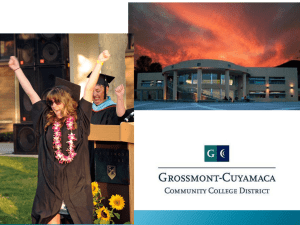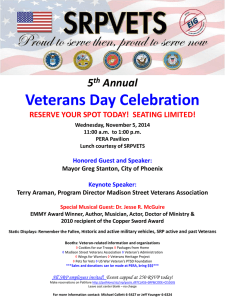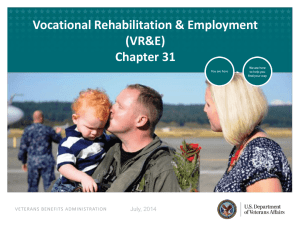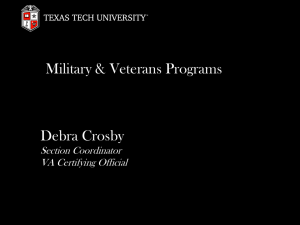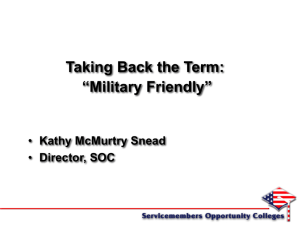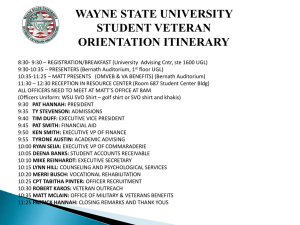Working with Veterans - Jewish Board of Family and Children`s
advertisement
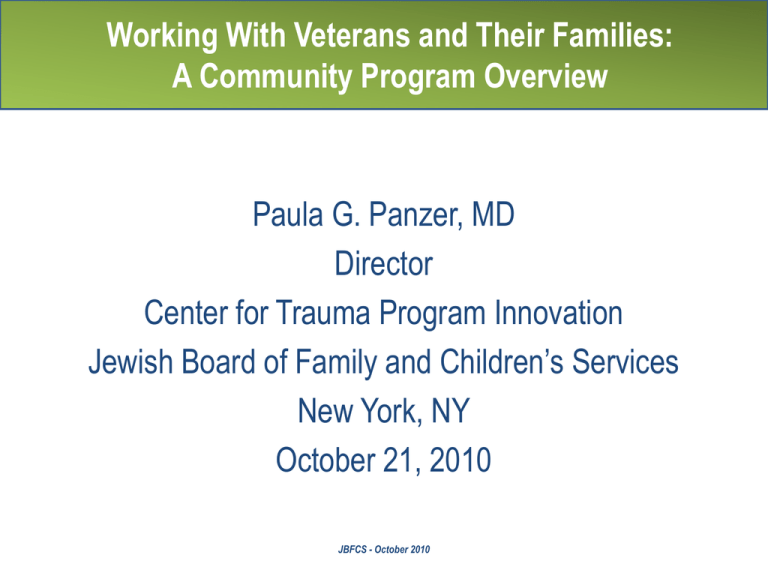
Working With Veterans and Their Families: A Community Program Overview Paula G. Panzer, MD Director Center for Trauma Program Innovation Jewish Board of Family and Children’s Services New York, NY October 21, 2010 JBFCS - October 2010 Acknowledgements • Home Again Project Coordinator: Adriana Rodriguez, LCSW • Project Team – CUNY Office of Veterans Affairs: Wilfred Cotto, Director – Project Assistant: Rebecca Wynn – Veteran Peer Advocates: Reneel Langdon; August Coleman; Danessa Duverce – New York State Psychiatric Institute/Columbia University Trauma and PTSD Program: Yuval Neria, PhD, Director; Maren Westphal, PhD, Research Project Manager – Jewish Board of Family and Children’s Services Center for Trauma Program Innovation is a National Child Traumatic Stress Network Member JBFCS - October 2010 Acknowledgements Funding Home Again: Veterans and Families Initiative – NYS Health Foundation; Charles & Mildred Schnurmacher Fund Home Again: Reaching Out – McCormick Foundation and Major League Baseball “Welcome Back Veterans” JBFCS Staff training to prepare for community practice: van Ameringen Foundation JBFCS - October 2010 Veterans’ Access to Care • Is the issue access to care or use of care? – Think about • • • • • Care settings Linkages Relevance Reimbursement Flexibility • What do you have in your community? JBFCS - October 2010 Veterans’ Families - Access to Care • Families are broadly defined yet their adjustment and mental health needs can be specifically related to military exposure and cultural context • Family members can be a point of entry for care of Veterans • Access to targeted care is limited • Their needs may be individual AND family based JBFCS - October 2010 Problem Statement, Part I • Home Again and other programs face the same problem: the challenge of engaging veterans and their families in mental health care. • Hypothesis: Primary obstacle is stigma and fear of being perceived as weak, unable to move forward with life if mental health help is sought (and used). JBFCS - October 2010 Problem Statement, Part II • Other issues: – Veterans are distrustful and fear repercussions if they ask for help. – Those still in the National Guard and Reserve or in civilian law enforcement fear jeopardizing promotion or their leaders’ confidence. – Long deployments, family obligations and financial needs make veterans want to reintegrate quickly, without psychological self-care or reflection, feeding the avoidance that is symptomatic of PTSD. – Families with currently deployed service members have difficulty engaging in treatment due to added responsibility and stress at home. JBFCS - October 2010 Problem Statement, Part III • Home Again and other Veterans programs urgently need new outreach messages, methods, and approaches. • Home Again: Reaching Out – New communications strategy using Veterans to reach Veterans – Training Peer Advocates to bridge the gap between school and mental health service for those in need JBFCS - October 2010 Intervention Model • Provide an ongoing peer advocate outreach program to encourage and assist veterans in engaging in services and moving toward successful outcomes • Develop new ways of identifying veterans and their psychological challenges despite social stigma • Provide Access to families for support and services without obligation for Veteran family member use of service • Develop a city-wide psycho-educational campaign using media which reaches Veterans and their families • Prepare MH Serving Community for sub-specialty service • Partner, Partner, Partner JBFCS - October 2010 Home Again: Reaching Out — Start Up • • • • • • Veteran Serving Linkages Mental Health Serving Linkages Training Plan Outreach Work Time Line Fundraising alongside Case Finding JBFCS - October 2010 Lessons Learned from Veterans • Sources of information • • • • Advisory Board Focus Groups Semi-structured interviews Feedback at tabling events JBFCS - October 2010 Lessons Learned from Veterans • • • • • • Relevance Timing Connection to Peers Risk Connection to Work, Family Stigma • • • • • • Hope Prior Assumptions Housing Substance Use Cognition & Learning Military Understanding JBFCS - October 2010 Lessons Learned from Veterans • Some examples from “What Therapists Should Know” handout: – Therapists should know what type of threats veterans face while deployed in a combat zone (for example: improvised explosive devices, vehicle-based explosive devices, suicide bombers, and rocket-propelled grenades). – Therapists should understand that being in a combat zone is different than being at a duty station. JBFCS - October 2010 Lessons Learned from Veterans • Some examples from “What Therapists Should Know” handout: – Therapists should understand that there is a lot of sexual harassment in the military for both men and women. – Therapists should understand that veterans are used to a structured environment. JBFCS - October 2010 Lessons Learned from Veteran Serving Systems • It is critical to have a veteran: – Provide encouragement to a veteran to access services – Vouch for the program’s quality of services. • Programs need to be established for several years before receiving a steady stream of referrals. • Linkages with VA are important AND competition and role remain issues. JBFCS - October 2010 Prepare MH Serving Community • • • • • Military Cultural Competence Engagement Targeted Treatments Access to Linkages for cases which can’t be served Address funding issues JBFCS - October 2010 Interventions Capacity to provide evidence informed interventions • Assessment (include suicidality and family violence risk evaluation) • Brief individual and family interventions • Targeted treatment for PTSD, traumatic depression, substance use, TBI, etc. • Cognitive Processing Therapy for PTSD in Veterans & Military Personnel JBFCS - October 2010 Useful Web Sites • National Center for PTSD – http://www.ptsd.va.gov • Military Cultural Competence – http://www.ptsd.va.gov/professional/ptsd101/flash-files/Military_Culture/player.html – http://deploymentpsych.org/ • Cognitive Processing Therapy (CPT) – http://cpt.musc.edu – http://www.essentiallearning.net/Student/content/sections/Lectora/CognitiveProcessingTherapyforP TSDinVeteransandMilitaryPersonnel/index.html • NCTSN Military Families Knowledge Bank – http://mfkb.nctsn.org • NYS Health Foundation: Returning Veterans & Families Resource Center – http://www.nyshealthfoundation.org/section/resources/veterans_resources JBFCS - October 2010 Contacts Paula G. Panzer, MD ppanzer@jbfcs.org Home Again: Veterans and Families Initiative (646) 957-0853 www.homeagainveterans.org http://homeagainveterans.blogspot.com/ JBFCS - October 2010


